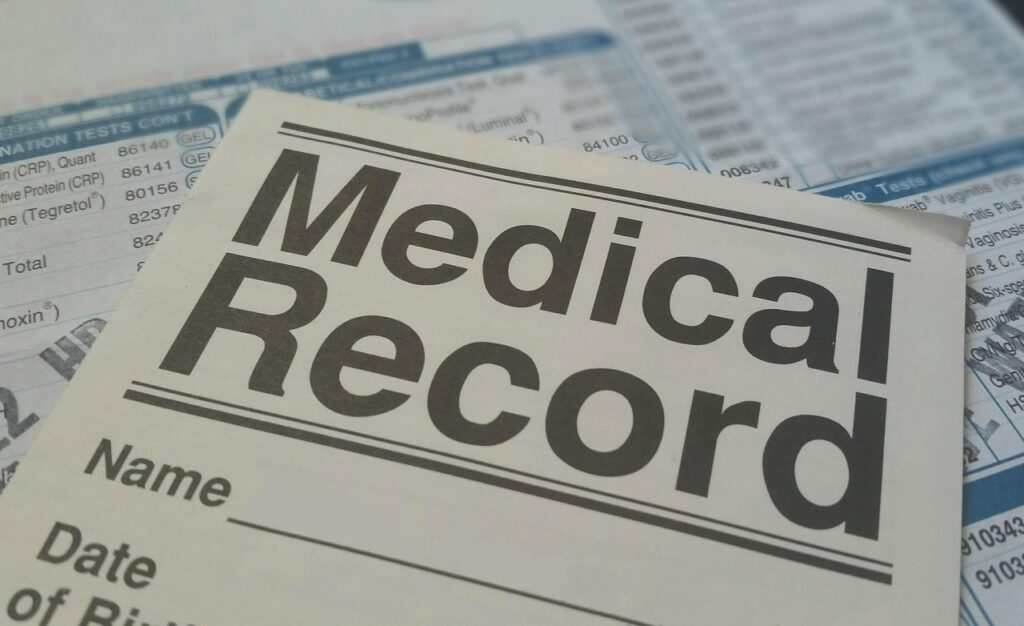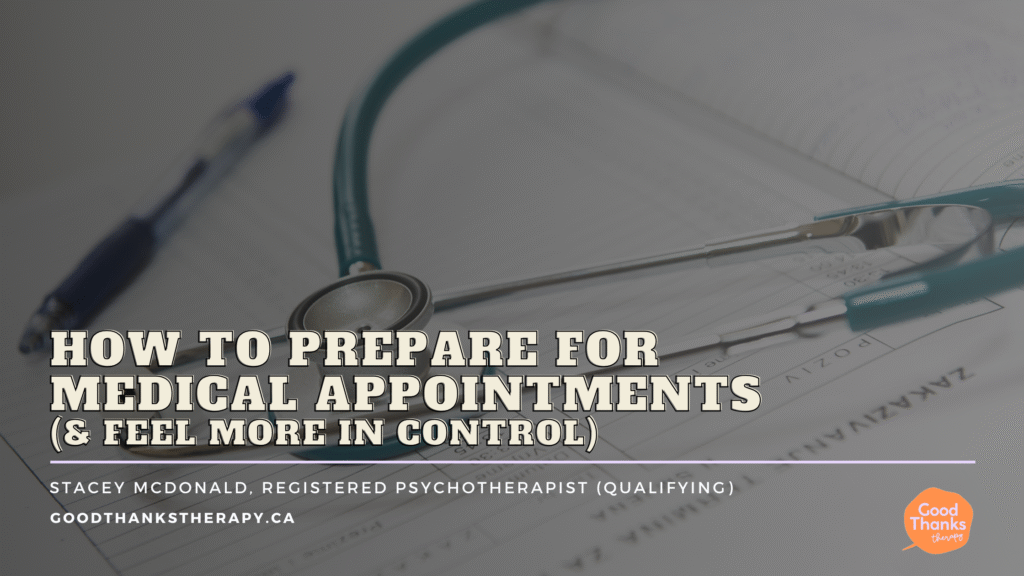Chronic illness therapy guelph
If you’ve ever had to regularly access the healthcare system or get specialized care; especially as someone chronically ill or with a marginalized identity you know just how much control the system can try and remove from you. Top this off with medical trauma, and it’s no wonder people dread, fear or even avoid accessing medical care. When a system has invalidated, traumatized and dismissed you – the natural response is to protect yourself from experiencing those things again, however, when it comes to medical care – especially if you’re chronically ill – that’s not an option.
So how can you regain some control in medical situations and feel better prepared?
How to Prepare for Medical Appointments
1. Don’t be afraid to follow up.

Image by Vinzent Weinbeer from Pixabay
Whether it’s a referral, a diagnostic test or results. If you don’t hear from them in a reasonable amount of time, follow-up. The fact is, the medical system can be slow – so it may just be that this is how long it takes to hear from someone, but at the same time, people do get lost in the system pretty regularly. In most cases, you can contact your family doctor to check on progress, or contact the specialist or lab directly to inquire about wait times, results, etc. This may also give you the opportunity to be put on a wait list for an earlier appointment.
2. Repeat after me: “I’d like you to document that in my chart.”

Image by Free-Photos from Pixabay
If you feel like you’re being dismissed by someone, refused referrals, or not offered adequate support (and treatment options), ask them to document these decisions in your chart. What’s the purpose of this? It ensures that your doctor is documenting these incidents of refusal of support or lack of care. While it should be a given that doctors write these things in their notes, sometimes lack of action (no new referrals, prescriptions, etc) get left out. This also will mean that should any other doctors, specialists, etc see your medical file in the future relating to this concern they will be able to track what was and was not done. How do you know that they are documenting this when asked? That’s where the next tip comes in…
3. You have the right to request your medical files at any time.

Image by vjohns1580 from Pixabay
You can contact your doctor or medical professional for access to your medical records (there may be a fee). In Canada, there are only certain circumstances where your file may not be provided to you. If you receive your records, you also have the right to request an amendment to information that you feel is incomplete or inaccurate. For more information on this see ipc.on.ca
4. Keep your own records.

Image by Darko Stojanovic from Pixabay
Especially if you need to access healthcare regularly. Document your symptoms, visits, doctor recommendations, medications (and changes), side effects, tests (and results), etc. Bring a support person or ask to have someone on the phone/record the visit if you feel you need it. There are all kinds of ways to record your medical information such as:
- A medical binder (you can find templates online)
- A symptom diary
- Keeping and requesting copies of all results
- Keeping a record of all medical appointments in a calendar or agenda
5. Ask for tests, referrals, second opinions if needed.

Image by Best Ovarian Cancer Treatment Centre in Raipur from Pixabay
In Canada, with long wait times and an inability to self-refer for most services we often feel stuck with our primary care doctor and whatever decisions they make. However, you can ask for certain things like tests, referrals (or second opinions). If they refuse, ask for their reasoning and if it doesn’t make sense to you or you find their answer unsatisfactory, ask them to document these decisions in your file. Continue to keep your own records, and continue to ask for the care you feel you need.
There can be a thin line here between self-diagnosis and appropriate demands. While I am a big believer that people know their bodies better than any one and being persistent in your medical care is important, we can’t ignore the vast amount of misinformation and TikTok diagnoses that are occurring.
6. Take care of yourself, and build your supports.

Photo by Thirdman
Maybe the most important part. Make sure you are caring for yourself, and I don’t mean just physically or in the way your doctor would request of you. I mean by having a support system (friends, family, massage therapists, physiotherapists, psychotherapists, community, etc) and also tools that help you manage the inherent stress and other big feelings that come with accessing medical care.
Things like grounding objects for appointments, earplugs or headphones for settings like hospitals that increase your anxiety, cold water to drink (or place the bottle on your wrists or neck for help regulating), meditations or coping skills that help you.
Conclusion

Photo by Photo By: Kaboompics.com
Our systems are set up to make it so that patients feel like they have an inherent lack of control over their own care. However, there are ways for you to regain bits of control over you care and ensure you are getting the treatment you need. While it can be exhausting, especially if you live with chronic illness or a marginalized identity, remembering the areas in which you have control can alleviate some of the stress that can be associated with medical care.
If you live with chronic pain, chronic illness, have experienced medical trauma or are struggling with accessing medical care as someone living with a marginalized identity (2SLGBTQIA+, BIPOC, disabilities, etc) accessing the medical system can take a toll on your mental health. If you are in need of a bit of extra support, Stacey has lived experience of chronic health conditions, being 2SLGBTQIA+ and medical trauma. She offers in-person therapy in Downtown Guelph and virtual therapy across Ontario. Book a FREE 20 minute consultation to see if you’re the right fit!



